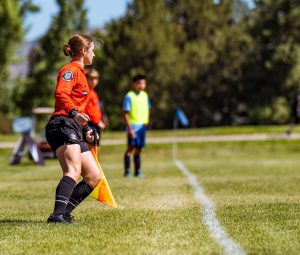- Slug: Sports-Referee Data. 1,380 words.
- Photos available (thumbnails, captions below)
- 2 graphics available here and here.
By Lorenzo Lopez
Cronkite News
PHOENIX – There’s a shortage of soccer referees across the United States, including in Arizona, and it’s easy to see why: The logistics of games going on every week, the number of certified referees, strain on refs and ongoing abuse from fans, players and coaches.
Despite the problems that come with refereeing, Arizona soccer refs say there are numerous benefits that come with refereeing and encourage others to become certified referees.
Staffing hundreds of soccer games
During the season, there are hundreds of soccer games every weekend in Arizona, and there aren’t enough referees to cover every game.
Chris McConkey, the Arizona State Referee Administration national assignor, has had to assign upwards of 700 games in a weekend during the fall. McConkey assigns refs for games across the state in multiple leagues, ranging from youth soccer to college to semiprofessional.
Considering that every game needs three officials – one referee and two assistant referees – a total of 2,100 referees might be needed on busy weekends.
Most referees do work several games a day, so McConkey estimated she could need around 700 to 800 referees for a packed weekend.
Sometimes games have to be called off because finding referees to cover the games isn’t possible.
The Arizona State Referee Administration reported roughly 700 referees quit due to various reasons this year, but there were nearly 1,500 new certified referees registered for 2024, according to State Youth Referee Administrator Joel Votaw.
Referee abuse
Since the administration created an abuse-reporting form in 2021, there have been an alarming 124 reports of soccer referee abuse filed in Arizona. Of those reports, around 46% were targeted at referees who were minors.
Verbal abuse reports included explicit language and derogatory remarks such as “F— you ref,” “Racist F—ing refs,” “You are terrible ref,” and some of the most common: “Open your eyes ref” and “Are you blind?”
Abuse has been a factor in referees – especially those who are minors – quitting.
Votaw said referee abuse isn’t going away but that there are measures that can diminish it.
He said helping referees get better at officiating and having more education about how to become better officials could help. Votaw also believes that spectators and parents should think about getting certified as referees so they understand the game better.
“It would help if parents got certified so they would understand why certain calls are being called for what they are,” Votaw said. “Some of the abuse that’s coming is from parents not knowing what was called.”
He also wants to see punishments for referee abuse be more public, to set a standard throughout the state.
“We don’t want to single any individual out about their behavior,” Votaw said, noting reports need to be shared more widely among referees. “The goal is for reports to be spread out more publicly and for punishments to be public so everyone can see how severe certain behaviors are punished.”
Physical strain
In addition to abuse, refs also face a physical toll as they work multiple games in a weekend. A soccer referee at the professional level runs an average of 6 to 8 miles a game, according to an article in Runner’s World.
Sometimes referees have to run as much – or more – than the players on the field.
Three referees and three assistant referees shared exercise data gathered from their smartwatches for a sample of 10 games from 2023 each.
This sample of referees typically ran roughly 5 to 6 miles per game while assistant referees, who don’t cover the full length of the pitch, ran between 2 and 3 miles a game.
Referees have to do whatever they can to stay healthy as some of the common injuries they face are shin splints, ankle injuries, knee pain and fatigue.
Referee pay
Referees do get paid, but it varies widely by the league.
Typically, the more experience that a referee has, the higher the pay. The better-paying games in the U.S. are Division I college level, and the professional tiers, such as the United Soccer League Championship, USL League One, MLS and National Independent Soccer Association.
Professional referees who are under contract can make more than $100,000 a year. Youth leagues tend to pay between $50 and $100 per game.
Rodrigo Perez, who graduated from Arizona State University in spring 2023, said refereeing soccer when he was in high school was the “perfect part-time job.”
“I played soccer and also refereed when I was in high school, and it was a perfect part-time job because it was something I was very familiar with,” Perez said. “It gives you the responsibility of it being an actual job, but you’re already familiar with how it works when you go into it.”
Some referees, including Perez, build a passion for officiating and try to pursue it as a career.
“The main reason I decided to stay around the game was because I ended up enjoying it and being part of the game,” Perez said. “I love being around the game, challenging myself and learning from other people on how to get better.”
Perez has aspirations to become an MLS referee and to work the biggest games in the country.
Positives of becoming a referee
Despite the hardships, there are plenty of reasons why people become referees.
Just ask Clarence Clark, who made his USL debut as an assistant referee this season.
“If the opportunity presents itself, it’s a great idea to progress and learn as a referee since you never know what can open up,” Clark said. “It’s also important to give back to the game and teach other upcoming referees about the game.”
Clark played American football in college and said it’s easier to progress as an official rather than an athlete.
“I did get scholarship money for football, but once I graduated, I knew that was my peak. As a referee, it was easier to develop, and if everything goes well, it can be a great part-time career option,” he said.
Refereeing keeps athletes healthy and offers a paycheck to run and exercise, all while still being involved with the sport.
“Being a referee keeps you fit,” Clark said. “It has made me train for my matches and keep myself fit to do professional games.”
Clark also has enjoyed all the connections that he’s made along the way, and that wouldn’t have been possible without refereeing. It also provided opportunities to travel.
“I love to broaden my interests, and refereeing can also help with connections such as friends, love interests, other job opportunities and many more,” Clark said.
Referees are independent contractors and can work for whomever and whenever they want.
Mersha Kisiel said his soccer ref schedule was flexible when he was attending Northern Arizona University.
“It’s a fantastic side hustle, and it was pretty much my main way of paying for college,” Kisiel said. “I got to decide what days I wanted to work and also the amount of games I wanted to do.”
Kisiel consistently works NCAA matches during the season and enjoys the people he’s met and the places he’s gone.
“I’ve traveled for games for the United States Soccer Federation and the NCAA,” Kisiel said. “There aren’t many jobs that allow you to travel and have all your expenses paid for.”
Sydney Dirks has been refereeing for five years and urges anyone, especially women, to get registered as a referee.
“There is still work to be done with support for female officials, but there has certainly been a growing network of female referees across the United States,” Dirks said. “We all cheer for each other, set boundaries, demand respect, break down barriers and pave the way for up-and-coming female referees.”
For more information on how to become a certified soccer referee visit www.azref.com or www.aiaonline.org.
Anyone can become a referee, but Kisiel especially urges anyone who plays soccer to get involved with the game as an official.
“For someone who used to play soccer and doesn’t want to play any more past high school, being a referee is a perfect job for you,” Kisiel said.
For more stories from Cronkite News, visit cronkitenews.azpbs.org.
^__=







